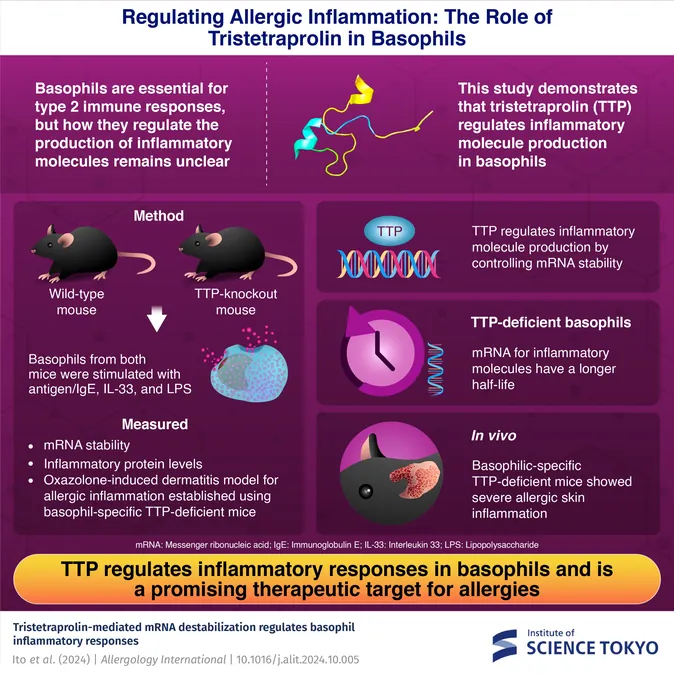
A Groundbreaking Study Unveils TTP as a Game-Changer in Treating Allergic Inflammation
2025-01-02
Author: Daniel
Introduction
In a remarkable discovery, researchers from the Institute of Science Tokyo have uncovered a potential new target for therapeutic interventions in allergic inflammation. Their study, led by Professor Kensuke Miyake, places the spotlight on basophils—rare immune cells that contribute to allergic reactions. Though they make up less than 1% of white blood cells, basophils have proven vital in unleashing pro-inflammatory cytokines like IL-4, which are key players in allergic responses.
Research Findings
Until now, the intricate molecular mechanisms governing cytokine production in basophils were largely a mystery. This groundbreaking study, published in Allergology International on November 15, 2024, delves into the role of tristetraprolin (TTP)—an RNA-binding protein that turns out to be essential in controlling inflammatory responses in these cells.
Miyake and his team employed a variety of innovative methodologies, including RNA sequencing (RNA-seq) and SLAM-seq, to analyze gene expression and mRNA stability. They investigated both wild-type and TTP-knockout mice to unveil the influence of TTP on basophil behavior when exposed to antigens, IL-33, and lipopolysaccharide (LPS).
Impact of TTP on Basophils
The findings were striking. Basophils from TTP-knockout mice exhibited prolonged mRNA stability for inflammatory cytokines such as Il4 and Il13, resulting in an overproduction of cytokines and chemokines, which exacerbates allergic responses. The researchers went a step further by creating basophil-specific TTP-knockout mice. In a skin allergy model, these genetically engineered mice displayed severe allergic inflammation, evidenced by increased ear thickness and pronounced skin scaling—indicators of heightened inflammatory responses.
Conclusion
Miyake emphasized the importance of TTP, stating, “By promoting the degradation of mRNA for inflammatory molecules, TTP prevents their overproduction. Without TTP, these mRNAs remain stable longer, leading to excessive cytokine production and intensified allergic reactions.”
This pivotal research casts TTP as an essential player in regulating inflammatory responses in basophils, suggesting that targeting this protein could inspire novel approaches for treating allergic diseases. Imagine a future where conditions like asthma and atopic dermatitis are managed with precision therapies specifically designed to regulate TTP pathways!
Furthermore, with allergies on the rise globally, this study is not just timely but urgent, revealing a promising direction for the development of targeted therapies that could revolutionize the landscape of allergy treatment.
In conclusion, the researchers' findings illuminate TTP's role in controlling allergic inflammation, offering valuable insights that could lead to improved patient outcomes through more effective and tailored treatments for allergy sufferers everywhere. Could we be on the brink of a new era in allergy management? Only time will tell!
 Brasil (PT)
Brasil (PT)
 Canada (EN)
Canada (EN)
 Chile (ES)
Chile (ES)
 Česko (CS)
Česko (CS)
 대한민국 (KO)
대한민국 (KO)
 España (ES)
España (ES)
 France (FR)
France (FR)
 Hong Kong (EN)
Hong Kong (EN)
 Italia (IT)
Italia (IT)
 日本 (JA)
日本 (JA)
 Magyarország (HU)
Magyarország (HU)
 Norge (NO)
Norge (NO)
 Polska (PL)
Polska (PL)
 Schweiz (DE)
Schweiz (DE)
 Singapore (EN)
Singapore (EN)
 Sverige (SV)
Sverige (SV)
 Suomi (FI)
Suomi (FI)
 Türkiye (TR)
Türkiye (TR)
 الإمارات العربية المتحدة (AR)
الإمارات العربية المتحدة (AR)